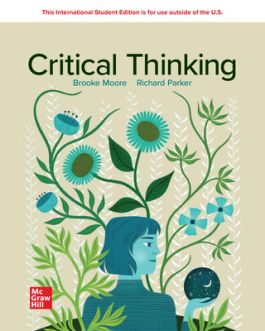Critical Thinking: 2024 Release ISE
1264517572
·
9781264517572
Moore and Parker’s Critical Thinking is not about critical thinking as much as it is a text in critical thinking. It provides guided practice through hundreds of exercises and examples, to help students apply content and think critically themselves…
Leer Más
PRODUCTO DIGITAL EBOOK. NO ES UN PRODUCTO FÍSICO.
Gracias este es un libro electrónico o EBOOK, para poder utilizarlo debes de crear una cuenta en VitalSource Bookshelf esta es una Aplicación Gratis. Una vez que has creado tu cuenta, dentro de la plataforma debes de redimir los distintos códigos que hayas adquirido para poder leer tus libros.- Ingresa a tu libro desde cualquier lugar o dispositivo, con acceso a internet o sin acceso.
- Crear notas, y apuntes en tus lecturas.
- Puedes realizar búsquedas a los conceptos que necesites de manera rápida y fácil.
- Ingresa a tu libro desde cualquier lugar o dispositivo, con acceso a internet o sin acceso.
- Crear notas, y apuntes en tus lecturas.
- Puedes realizar búsquedas a los conceptos que necesites de manera rápida y fácil.
1 Driving Blindfolded?
2 Reasoning and Arguments?
3 Vagueness, Generality, Ambiguity, and Definition?
4 Believability of Claims and Credibility of Sources
5 Linguistic Persuasion Devices
6 Bogus Logos Part I: Relevance Fallacies
7 Bogus Logos Part II: Induction Fallacies?
8 Bogus Logos III: Formal Fallacies, Fallacies of Ambiguity, and Fallacies Involving Miscalculating Probabilities?
9 Deductive Arguments I (Natural Deduction): Categorical Logic?
10 Deductive Arguments II: Truth-Functional (Sentential) Logic?
11 Inductive Reasoning?
12 Moral, Legal, and Aesthetic Reasoning
2 Reasoning and Arguments?
3 Vagueness, Generality, Ambiguity, and Definition?
4 Believability of Claims and Credibility of Sources
5 Linguistic Persuasion Devices
6 Bogus Logos Part I: Relevance Fallacies
7 Bogus Logos Part II: Induction Fallacies?
8 Bogus Logos III: Formal Fallacies, Fallacies of Ambiguity, and Fallacies Involving Miscalculating Probabilities?
9 Deductive Arguments I (Natural Deduction): Categorical Logic?
10 Deductive Arguments II: Truth-Functional (Sentential) Logic?
11 Inductive Reasoning?
12 Moral, Legal, and Aesthetic Reasoning
Moore and Parker’s Critical Thinking is not about critical thinking as much as it is a text in critical thinking. It provides guided practice through hundreds of exercises and examples, to help students apply content and think critically themselves. With an enjoyable, concise reading style and a visually clear layout, Critical Thinking trains students to improve information acquisition skills, recognize dubious claims, and hone critically important skills.
The authors’ expanded coverage on how to recognize dubious claims is gravely applicable in the current climate of fake news, deep fakes, and AI-created information. The authors provide guided practice in what instructors say are the most important critical thinking skill sets for students.
The authors’ expanded coverage on how to recognize dubious claims is gravely applicable in the current climate of fake news, deep fakes, and AI-created information. The authors provide guided practice in what instructors say are the most important critical thinking skill sets for students.

